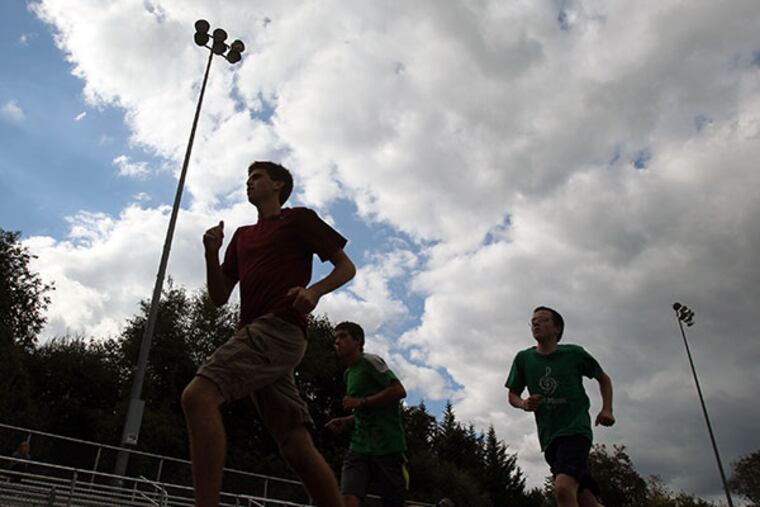New Hope-Solebury's canceling night games draws anger
NEW HOPE Judy Finn's fingers are sore. For weeks, the 40-year-old New Hope resident has been handcrafting blue-and-gold ribbons to hand out at New Hope-Solebury High School sports events.

NEW HOPE Judy Finn's fingers are sore.
For weeks, the 40-year-old New Hope resident has been handcrafting blue-and-gold ribbons to hand out at New Hope-Solebury High School sports events.
She's burned through about 220 yards of material, she said, creating ribbons for fans to pin to their clothes. At Friday night's football game, she gave out 150.
"Everybody was wearing them," she said.
That support, however, is not directed toward the football team. Instead, Finn's ribbons are to advocate another cause: keeping the school's sports games under the lights, as they have been for more than a decade.
Last month, the school board shocked many community members when it voted to cancel district night games after this fall, a decision that would affect football, soccer, field hockey, and other sports. The action followed years of complaints about stadium noise and lights from residents of Riverstone Circle, a stone's throw from the field.
The vote itself was controversial, but opponents have been particularly outraged over the process, which they contend was rash and self-serving.
The result has been an unusual public clash of sports, politics, and tradition, with hundreds taking to Facebook to express their outrage, hundreds more signing an online petition, and students chanting "save the lights" at Friday night's football game.
It's caused such an uproar that the school board is considering a special meeting next week on the topic.
Board President Amanda Elefante - who lives on the cul-de-sac affected by light from the stadium and who recused herself from the vote - would not say if the board plans to reconsider the decision. "I wouldn't want to speculate on what the board would or wouldn't do," she said.
Joe Harraka was one of two board members absent from the September meeting. He said he was never alerted that the issue would come to a vote that night, and now feels he was betrayed by his fellow board members.
"I didn't buy into this when I ran for the board," he said.
One resident pleased by the vote was Cobie Hoek, 53, who has lived on Riverstone Circle with her family for three years.
Hook said that the lights shine through their back windows with the intensity of daylight during games, and that the music is so loud it often drives them from the house.
"I didn't realize it'd be so intrusive," she said at her home last week.
That's why the board was considering whether to approve a $14,000 contract with an architect to survey the possibility of building a new stadium away from the homes.
But the board did not approve the contract, and toward the end of the meeting, it went a step further, proposing and approving the motion to end night games after this fall.
One vote to end night games came from Kurt Zander, a board member who lives on the cul-de-sac.
In a brief interview last week, Zander denied any conflict of interest in his vote. He declined to discuss the issue except to say, "I'm looking for a solution that works for everybody."
The only member who voted against the measure, Susan Atkinson, said she did not approve of the maneuver.
"This kind of decision sets a dangerous precedent that community engagement, transparency, procedure, and expert recommendations can be set aside by people who have taken an oath to serve the community," she wrote in an e-mail.
Finn and other community members are upset at the way the board handled the decision. The community, she said, "feels like they're being pushed around."
But people are also angry that night games will soon be eliminated, she said, since the games are as much a community event as they are an athletic contest.
Leah Ingram, 47, president of the high school field hockey booster club, said, "Taking away the stadium lights and the ability to have night games, that only takes away the opportunity for students to cheer on their teammates and parents to see their children play."
Finn's son, Cole Bramich, 14, a freshman on the junior varsity football team, said he was "kind of angry" at the board's decision.
Speaking after football practice last week, he said his message to the board would be a straightforward one.
"I'd say: 'Turn the lights back on,' " he said. "Simple as that."
609-217-8305
@cs_palmer